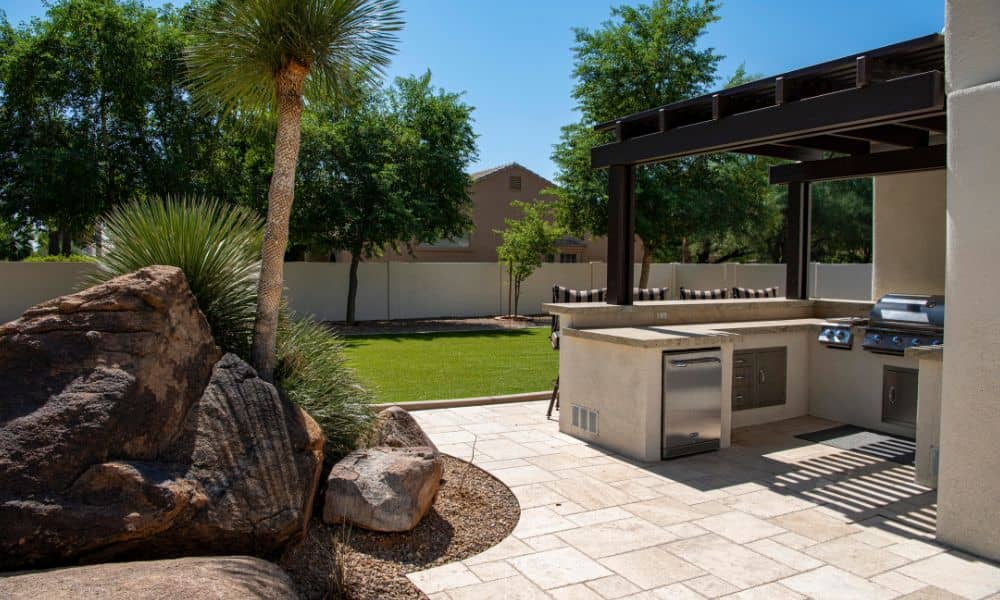
When you picture your dream outdoor kitchen, you probably imagine a built-in grill, warm lighting, and a smooth patio where everyone gathers. But the real hero of that space—often overlooked—is the surface under your feet. The brick pavers you choose can decide whether your outdoor kitchen stays strong for years or starts cracking after one Alabama summer.
Choosing the right pavers isn’t just about color or pattern. In Madison, where the weather shifts from humid heat to heavy storms, it’s about finding materials that can handle temperature changes, grease, and moisture without losing their charm.
Understand What Madison Weather Does to Brick Pavers
Madison’s red-clay soil expands when it’s wet and shrinks when it’s dry. That movement stresses everything above it—especially outdoor kitchens that carry more weight than a regular patio. Add in grill heat, cooking grease, and afternoon downpours, and you’ve got a mix that tests every surface.
So before you pick a style, you need to pick strength. Outdoor kitchens face not just people walking on them but also the load of appliances, countertops, and sometimes stone veneer. That means your brick pavers must be dense, durable, and resistant to stains.
Clay or Concrete? The Choice That Shapes Everything
There are two main kinds of brick pavers: clay and concrete.
Clay brick pavers are fired in a kiln, giving them a rich color that doesn’t fade easily. They handle heat well and match the tone of many homes. Clay pavers also stay cooler underfoot during summer and resist stains better if sealed correctly.
Concrete pavers, on the other hand, come in more sizes and shapes. They’re great for custom layouts but tend to absorb water and can fade faster in sunlight. For homeowners who love modern patterns, they’re a flexible choice—but they need sealing every few years to protect against grease and color loss.
If your outdoor kitchen includes a grill, smoker, or pizza oven, clay pavers usually hold up better to high heat. For lighter cooking setups, quality concrete pavers can still perform well as long as they’re properly rated and sealed.
Strength and Thickness Matter
A paver that looks perfect in the store might fail once it meets Alabama weather. Always check the ASTM C902 standard for paving bricks. This rating tells you the paver’s compressive strength and ability to resist freeze-thaw cycles.
For outdoor kitchens, choose pavers at least 2⅝ inches thick. Anything thinner can crack under the combined weight of cabinets and grills. In areas that get constant foot traffic or support appliances, thicker clay or concrete pavers will perform better over time.
Texture and Safety Underfoot
Outdoor cooking means spills—oil, sauce, and plenty of water from cleanup. A slick surface can be dangerous, especially near open flames. Look for brick pavers with a textured or tumbled finish. These surfaces grip better, reducing the chance of slips even when wet.
Avoid glossy sealers that create a film. Instead, use breathable, matte sealers designed for paver surfaces. They protect without making the surface shiny or slippery.
Color and Pattern: Blend Strength with Style
Color isn’t just about looks—it also affects maintenance. Mid-tone blends of red, brown, or charcoal hide dirt and grease better than solid light shades. Clay pavers naturally offer warm colors that pair beautifully with brick homes around Madison.
Patterns add personality and structure. Herringbone designs hold up best under movement because of their interlocking layout. Around grill islands or prep areas, use soldier courses or borders to frame sections neatly and prevent edge shifting.
When matching your new outdoor kitchen to your home’s existing masonry, bring a few sample bricks from your house or retaining wall to the supply yard. That small step ensures your space looks built-in, not tacked on.
Heat, Grease, and Maintenance Realities
Cooking outdoors exposes pavers to more heat and stains than a regular patio. Even the best materials need a little care to stay beautiful.
After installation, wait about two months before applying a sealer—this lets natural salts rise to the surface and wash away. Then, use a non-yellowing, high-temperature sealer made for brick pavers. It keeps grease and smoke stains from soaking in.
Once a year, give the surface a gentle power wash and inspect joints for loose sand. Every two to three years, reapply sealer in high-use areas. This simple habit keeps the pavers looking sharp and prevents long-term wear.
Buy Smart: Local Sources Know Madison Conditions
Before buying, ask your supplier the right questions:
- Are these pavers ASTM C902-certified?
- What’s their compressive strength?
- Are they kiln-fired clay or wet-cast concrete?
- How do they handle freeze-thaw cycles?
Local brick yards in North Alabama often carry materials designed for the region’s clay soil and temperature swings. They’ll also know which sealers and sands perform best here. When possible, buy from suppliers familiar with masonry work around Huntsville and Madison—local expertise often saves costly mistakes.
Built to Code, Backed by Standards
Professional masons follow guidelines from the International Residential Code (IRC R404) for drainage and foundation work, and ASTM C902 for paving brick performance. Knowing your materials meet those standards means your project isn’t just beautiful—it’s built to last.
When hiring a contractor, ask whether their work aligns with these standards. A reputable brick mason won’t hesitate to explain their process or show certifications for the products they use.
Final Thoughts
Your outdoor kitchen should feel like an extension of your home—solid, welcoming, and built for long evenings with friends. The right brick pavers make that possible. Choose pavers that balance beauty with strength, resist the climate, and match the look of your home’s masonry.
When done right, those bricks underfoot will handle summer barbecues, rainy nights, and family gatherings for decades.
If you’re planning your next outdoor kitchen or patio upgrade, talk to a local masonry expert. They can help you select the perfect brick pavers—ones that will keep your space safe, sturdy, and stunning season after season.